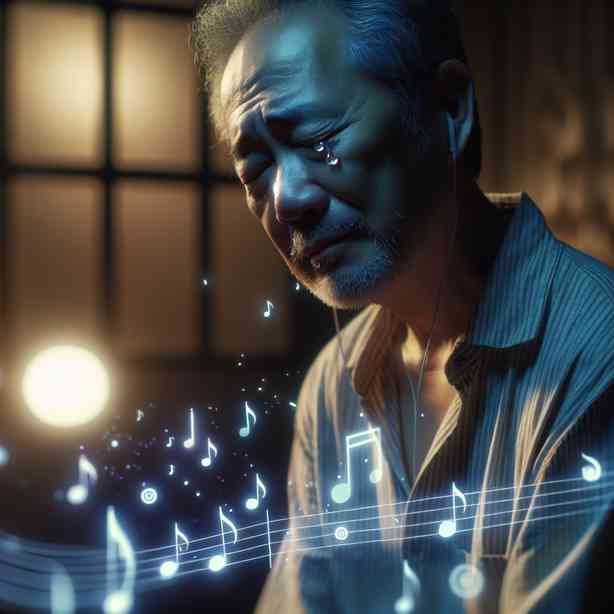
Lullabies have long been associated with childhood, often evoking images of parents gently rocking their babies to sleep with soothing melodies. However, it is not uncommon for adults to find themselves moved to tears when hearing a lullaby. This reaction can be deeply rooted in our emotional experiences, nostalgia, and even our current life situations. The phenomenon of an adult crying at a lullaby is a complex interplay of memory, emotion, and the music itself.
To understand why lullabies can evoke such intense emotions in adults, it helps to first explore the purpose and power of lullabies. Traditionally, these songs serve to soothe infants, creating a calm environment conducive to sleep. The soft tones and repetitive structures of lullabies are designed to engage a child’s attention while simultaneously promoting relaxation. As adults, the memories of being rocked to sleep or the feelings of safety associated with these songs can resurface, triggering emotional responses. This return to a time when we felt secure and loved can be overwhelming, especially if our current lives are filled with uncertainty or stress.
Moreover, nostalgia plays a significant role in why lullabies can make adults cry. When we hear a familiar lullaby, it often brings back memories of our childhood – moments spent with caregivers, family gatherings, or even solitary moments of introspection. These memories are often tied to strong emotions, whether they be happiness, longing, or grief. For many, lullabies are symbols of love and comfort, and the realization of how quickly time passes can bring feelings of sadness. This nostalgia can provoke tears, as we reflect on the innocence and simplicity of childhood, contrasting it with the complexities of adult life.
The act of crying while listening to a lullaby can also serve as a release of pent-up emotions. Life is filled with challenges, responsibilities, and pressures that can weigh heavily on our hearts and minds. When we encounter a lullaby, it can evoke a sense of safety and space to feel vulnerable. This emotional resonance allows us to confront feelings that we may have been suppressing. Tears can serve as a cathartic release, providing not only relief but also a means of connecting deeper with our emotions. Lullabies can thus function as a vehicle for adults to process their feelings in a gentle and nurturing context.
Additionally, the musical characteristics of lullabies contribute to their emotional impact. The melody, harmony, and rhythm of these songs are often crafted to induce a state of calm. The soft, flowing melodies can evoke a sense of peace, taking us to a mental place of tranquility. This soothing quality, combined with personal memories, can create a powerful emotional effect that catches us off guard. The gentle lull of a familiar tune can transport us back to moments of comfort, making it all the more poignant as adults navigating a world that often feels chaotic.
Interestingly, the context in which we hear a lullaby can also influence our emotional response. For instance, if we hear a lullaby during a stressful period, it may evoke feelings of longing for simpler times when life felt less complicated. Alternatively, it might remind us of loved ones, particularly if we associate specific lullabies with figures in our lives who have cared for us. This context-oriented response can bring forth a torrent of emotions connected to love, loss, or reminiscence, often manifesting in tears.
Cultural factors also play a significant role in how we respond to lullabies as adults. Different cultures have their own unique lullabies, often steeped in tradition and history. The cultural significance of these songs can imbue them with added emotional weight. For people who grew up with specific lullabies, the sound of these melodies may evoke pride, cultural identity, or a connection to one’s heritage. This connection can amplify emotional responses, leading to tears as adults reflect on their cultural narratives and familial bonds.
As we further delve into the psychological aspects of crying while listening to lullabies, it becomes evident that music and emotion are deeply interconnected. Music has been shown to impact our mood, evoke memories, and influence feelings. Lullabies, with their unique structure and purpose, tap into our emotional core in a profound way. Research has indicated that music can elicit powerful emotional responses, due in part to its ability to activate brain areas associated with emotions and memories. These responses can vary widely based on individual experiences, conditioning, and the music’s inherent qualities.
For some, crying at a lullaby can also be a source of healing. It may allow us to confront grief or sadness that has been lingering beneath the surface. When we allow ourselves to feel these emotions, we often pave the way for healing and growth, creating space for self-reflection and understanding. The tears shed while listening to a lullaby can signal a release, enabling us to process emotions that may seem overwhelming in our day-to-day lives. Rather than viewing the act of crying as purely negative, it can be reframed as a courageous step toward emotional wellbeing.
In conclusion, the act of crying to a lullaby as an adult is a multifaceted experience steeped in memory, emotion, and musicality. As these gentle melodies awaken feelings of nostalgia, safety, and vulnerability, they offer an opportunity for reflection and emotional exploration. The interplay between personal history, cultural context, and the inherent power of music forms a rich tapestry of emotional experience. Lullabies connect us to our past while simultaneously allowing us to confront the present and our often complex emotions. Thus, the tears that may flow upon hearing a lullaby are not just a sign of sadness; rather, they can signify love, longing, and an invitation to embrace our emotional landscape. In moments of respite found in these tender songs, we can find solace, healing, and a reminder of the importance of nurturing our emotional selves as we journey through adulthood.


